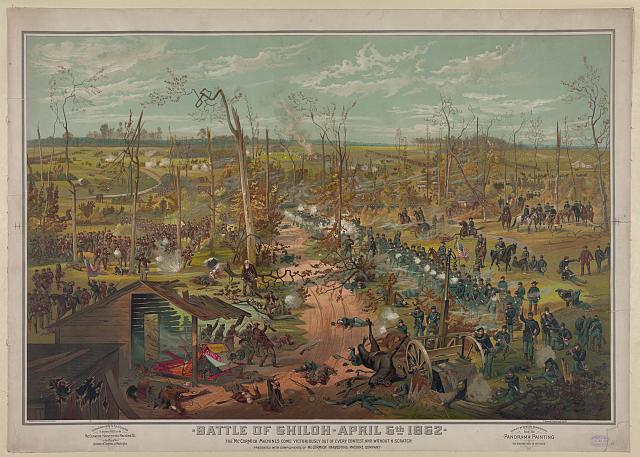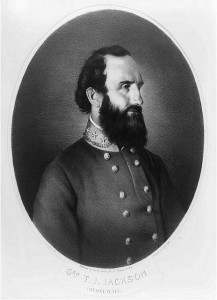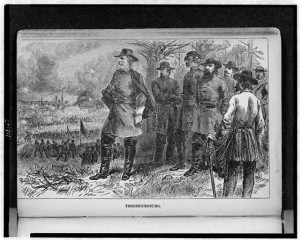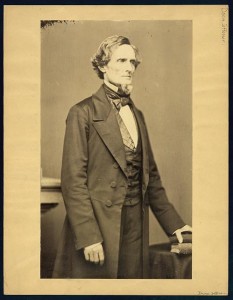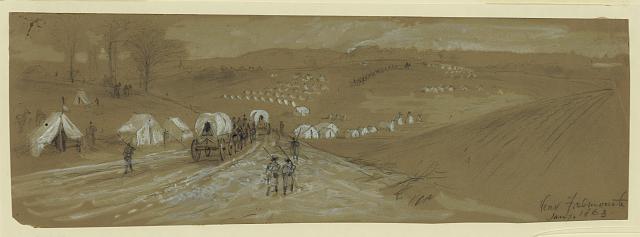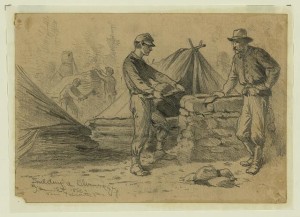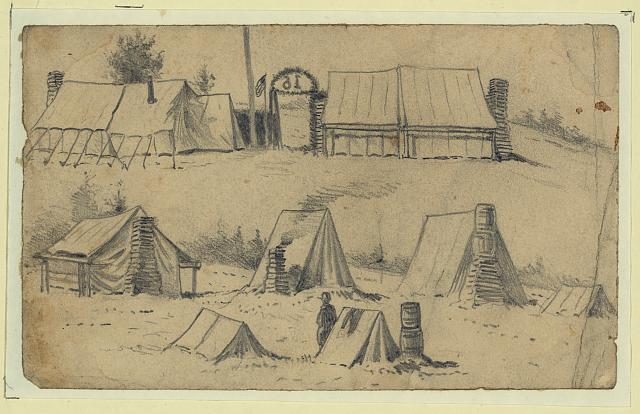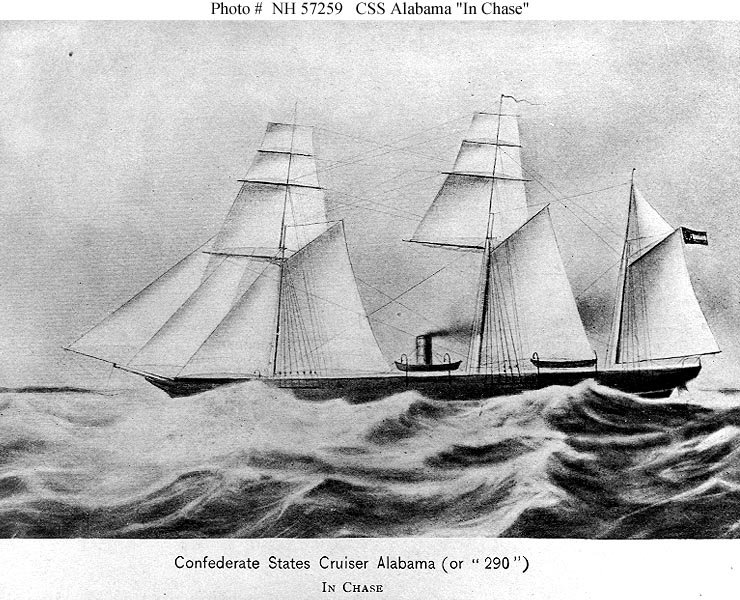
chasing American (and British) commerce
According to Wikipedia
The three major tasks of the Confederate Navy during the whole of its existence were the protection of Southern harbors and coastlines from outside invasion, making the war costly for the United States by attacking U.S. merchant ships world-wide and breaking the Union Blockade by drawing off U.S. Navy ships in pursuit of the Confederate raiders.
150 years ago this week the Richmond Daily Dispatch observed that the CSS Alabama in particular must be having some success with the second of these goals because “The New York Chamber of Commerce is still much exercised on the subject of the Alabama.” and reported on a series of resolutions by the Chamber. There was a more complete report in The New-York Times on January 3, 1863:
CHAMBER OF COMMERCE.; Important correspondence Resolutions Relative to Rebel Privateers Fitted Out in British Ports. … Maj. Gen. Butler. …
The following correspondence was read: …
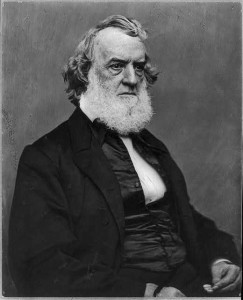
we’re already trying to hunt down the Alabama
FROM SECRETARY WELLES.
NAVY DEPARTMENT, Dec. 11, 1862.
SIR: I have received your letter of the 6th inst., inclosing a copy of a resolution passed at a meeting of the Chamber of Commerce of the State of New-York, on the 4th inst., recommending and suggesting that one or more naval steamers be dispatched to cruise about the Equator, etc., for the protection of American commerce, and in reply would respectfully state the Department has already dispatched armed vessels in that direction.
I am respectfully, your obedient servant,
GIDEON WELLES, Secretary of the Navy.
A.C. RICHARDS, Secretary Chamber of Commerce, New-York.
LIVERPOOL CHAMBER OF COMMERCE.
CHAMBER OF COMMERCE, LIVERPOOL, Dec. 6.
SIR: I am directed by the President of this Chamber to acknowledge the receipt of your letter of the 11th ultimo, (erroneously addressed to the Board of Trade in London,) transmitting a series of resolutions adopted by the Chamber of Commerce of the State of New-York, relative to the burning of the ship Brilliant by the steamer Alabama, and I am to inform you that it shall be laid before the Council of this Chamber at the earliest opportunity.
I remain, Sir, yours, &c.,
ROBERT TRONSON, Secretary.
J.A. STEVENS, Jr., Secretary Chamber of Commerce, New-York.
LONDON COUNCIL OF TRADE.
OFFICE OF COMMITTEE OF PRIVY COUNCIL FOR TRADE, WHITEHALL, Dec. 2, 1862.
SIR: I am directed by the Lords of the Committee of Privy Council for trade, to acknowledge the receipt of your letter of the 11th ult., and I am to request that you will inform the Council that the resolutions passed by the Chamber on the subject of the burning of various ships by the Alabama have been received, and will be laid before her Majesty’s Government. I am, Sir, your obedient servant,
J. EMMERSON TENNENT. …
The ravages of the pirate Alabama were then informally discussed, pending which Mr. LOWE introduced the following preamble and resolutions:
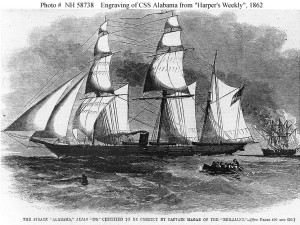
burning the Brilliant
Whereas, On the 21st day of October last, a statement emanating from Capt. HAGAR, of the ship Briliant, recently burned at sea by the captain and crew of the steamer Alabama, was produced in this Chamber, and a series of resolutions was unanimously adopted, the object of which was to warn the merchants of Great Britain in a friendly spirit of the evil consequences likely to ensue from a repetition of such piratical acts from the fitting out in the port of Great Britain, of other vessels like the Alabama, destined to plunder and destroy our commerce on the high seas; and,
Whereas, This Chamber is led to believe that other vessels have sailed from the ports of Great Britain, or are about to sail, for the express purpose of destroying American ships in distant parts of the world; and in an answer of Earl RUSSELL to the Council of the Liverpool Chamber of Commerce is found the following passage, to wit: “Sir, I am instructed by Earl RUSSELL, in reply to your letter of the 6th inst. respecting the destruction by the Confederate steamer Alabama of British property embarked in American vessels, and burned by that steamer. Earl RUSSELL desires me to state to you that British property on board a vessel belonging to one of the belligerents must be subject to all the risks and contingencies of war, so far as the capture of the vessel is concerned. The owner of any British property, not being contraband of war, on board of a Federal vessel captured and destroyed by a Confederate vessel of war, may claim in a Confederate Prize Court, compensation for destruction of such property.” And, whereas, action on the part of the Liverpool Chamber of Commerce, so far as is at present known, has been limited to a reference of the proceedings of this Chamber to their Council, and on the part of the Lords of the Committee of Privy Council for trade to Her Majesty’s Government, as set forth in the two communications just read from Messrs. TRONSON and TENNENT, Secretaries of these bodies.
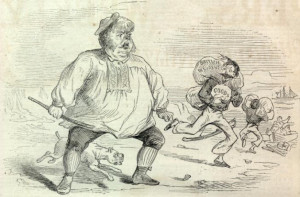
THE PIRATE “ALABAMA.”
JOHN BULL ( furious.) “Hallo! there, SEMMES; that’s my Property. Fair play, you Rascal! If I’d suspected this, you’d never have got out of Liverpool!” (“Most of the property destroyed by the Pirate SEMMES on board the vessels he has seized was insured in England, and the loss will consequently fall on Englishmen.”—Daily Paper
And whereas, Since the month of October last, it has come to the knowledge of this Chamber, that the Laurette, T.B. WALES, and other ships have been captured and burned by the Alabama, and that in the first named, a considerable portion of the cargo was on British account, and certified to be such, and under the hands and seal of a British consul; and whereas, There is no evidence before this Chamber to show that in the absence of a recognized government of which to demand redress, the British government has issued orders to the naval commanders of her Britannic Majesty’s ships of war to hunt down and destroy the Alabama, as an offender against the property and honor of Great Britain as well as an offender against the rights and interest of humanity; and, whereas, it is alleged that the Alabama is continually supplied from Great Britain with coal and ammunition, by means of which she is enabled to continue her piratical courses against American commerce; the consequence being to raise the premium of insurance on American vessels and their cargoes, and to depress the rates of freight on American ships; and to transfer our carrying trade to vessels of other nations; this Chamber is led to the following conclusions:
1. That through the active instrumentality of the subjects of Great Britain, the so-called Confederate States are furnished with ships, men, arms and ammunition, with which to war upon the commerce of the United States.
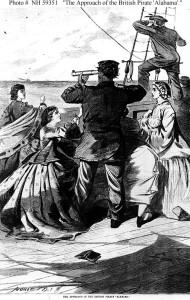
Alabama on the horizon
2. That without such foreign aid the States in revolt against the Government of the United States would be powerless to effect any injury to our commerce on the high seas.
3. That this war upon American commerce, carried on by ships built and manned in Great Britain, is not rebuked by the British Press generally; is not discouraged by the public sentiment of a once friendly nation claiming to be governed by high and honorable principles, and is not effectively and thoroughly arrested by the strong will and stronger arm of the British Government.
4. That as a result of the foregoing facts and conclusions, the merchants of the United States are subjected in a certain degree to the evils that would attend a state of war with Great Britain, and are compelled to witness the carrying trade of their country transferred from their own vessels to — British bottoms, under all the sanctions and advantages of peace and neutrality to the latter — white the source of this great peril, threatening to drive American commerce from the ocean is of British origin.
Now, therefore, Resolved, That a Committee of ten be appointed to take into consideration the foregoing, and to report, at a special meeting to be called for the purpose, what action it becomes this Chamber to take in the premises.
Mr. LOWE urged the passage of the above in a brief and calm statement of the facts regarding the Alabama, and also read a letter from our Consul at Liverpool, Mr. DUDLEY, detailing the efforts made by him to induce the British Government to prevent the Alabama from sailing. Mr. DUDLEY states that four more privateers are now being built in Liverpool and one in Glasgow, and that their aim and purpose is well known to the English Government. …
Mr. MAURY stated that he had private advices from England that the Alabama was so constructed as to to be able to evade the fastest war steamer afloat, and that other privateers were building for the rebels that would even excel her. …
Yesterday we had an article about Nathaniel Banks, Ben Butler’s successor in New Orleans. Beast is spending time in New York and Washington these days:
The steam transport S.R. Spaulding, Capt. HOWES, arrived Thursday morning, from New-Orleans on the 24th ult., bringing as passengers Maj.-Gen. B.F. BUTLER, Mrs. BUTLER, and the General’s Staff. The entire party went to the St. Nicholas Hotel, where Gen. BUTLER quietly passed the day, receiving visitor from his intimate friends, but avoiding anything in way of a public reception by keeping the knowledge of his arrival secret. Yesterday morning Gen. BUTLER, accompanied by Col. SHAFFER, Chief Quartermaster, Capt. HAGGERTY, Judge Advocate, and Capt. PUFFER, Aide, took the early train for Washington. He will return to this City in a day or two.
The political cartoon of Raphael Semmes, the Alabama’s commander, taunting John Bull was published in the November 15, 1862 issue of Harper’s Weekly hosted at Son of the South

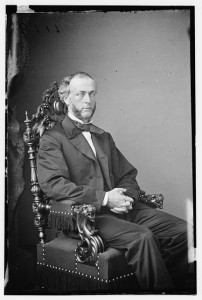
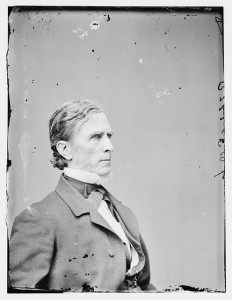
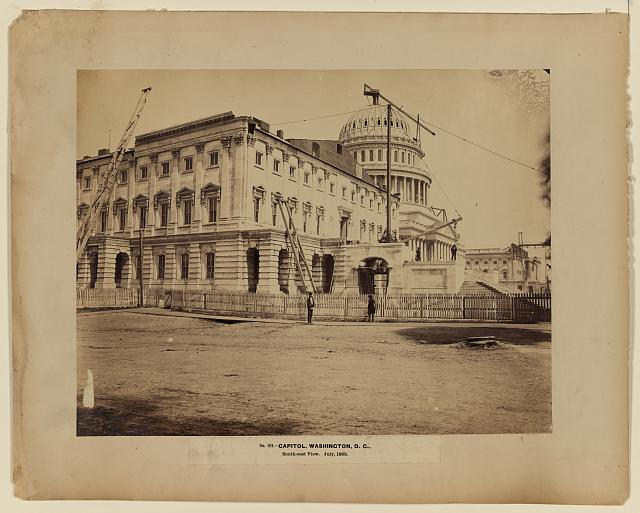
![Study of infantry soldier on guard--William J. Jackson, Sergt. Maj. 12th N.Y. Vols.--Sketched at Stoneman's Switch, near Fredricksburg [sic], Va. Jan. 27th, 1863 (by Edwin Forbes, January 27, 1863; LOC: LC-DIG-ppmsca-20516)](https://www.bluegrayreview.com/wp-content/uploads/2013/01/20516r-232x300.jpg)

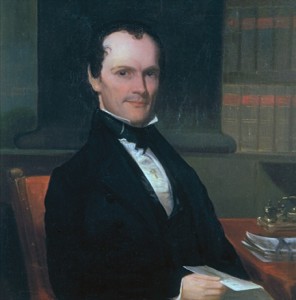
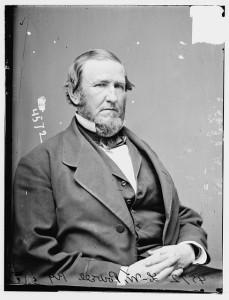
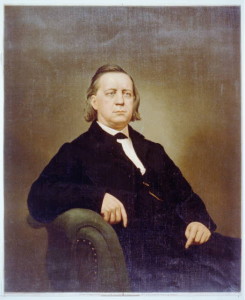
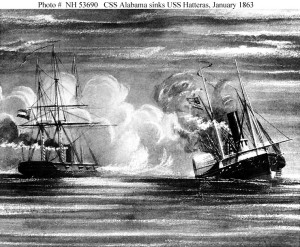
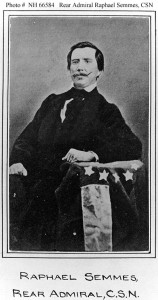
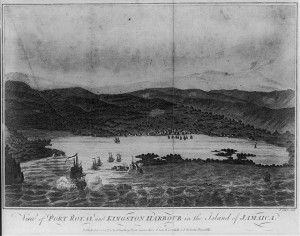
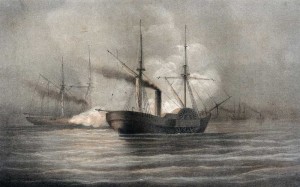





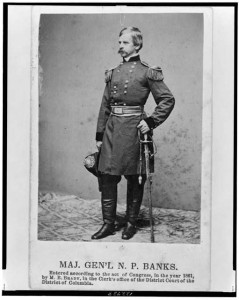
![Bombardment of Fort Sumter, Charleston Harbor: 12th & 13th of April, 1861 (Currier & Ives, [1861?]; LOC: LC-DIG-ppmsca-19520)](https://www.bluegrayreview.com/wp-content/uploads/2013/01/19520r-300x213.jpg)
